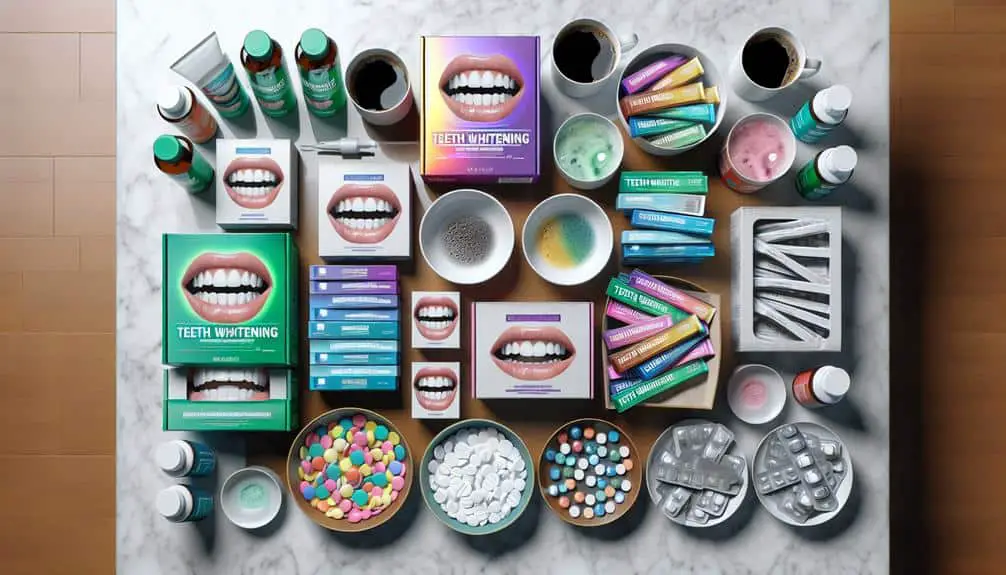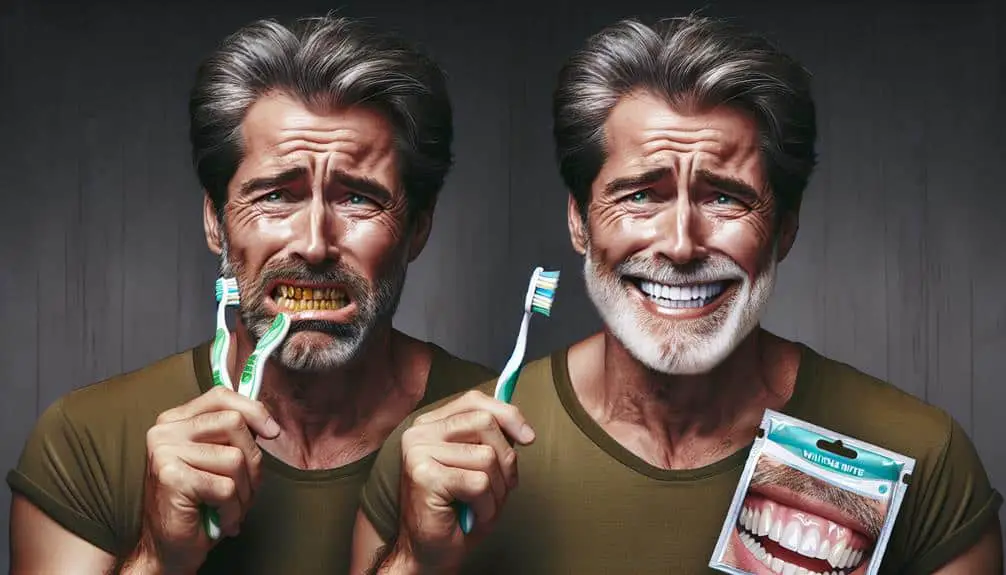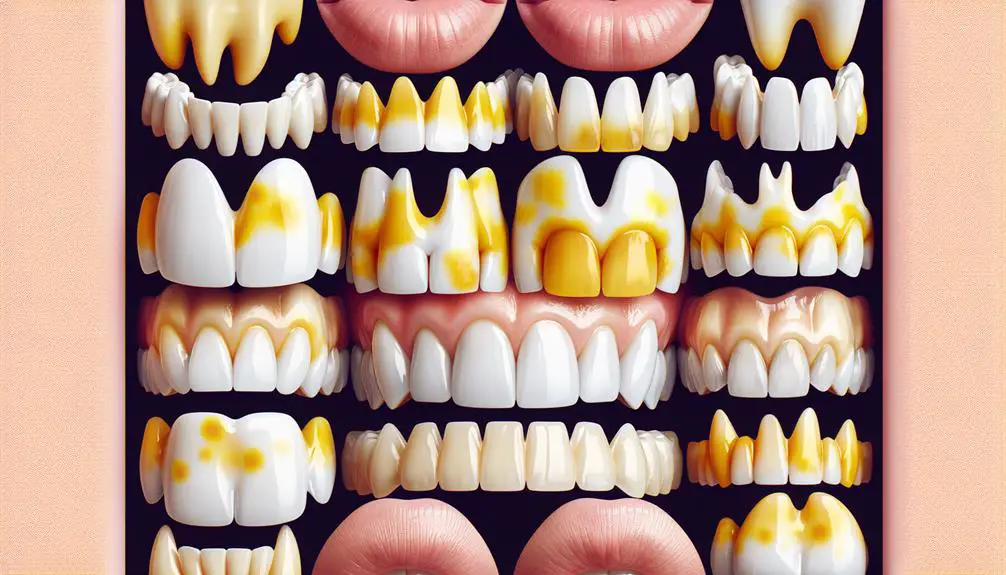To tackle medication stain discoloration, try gentle brushing with a soft-bristled brush in circular motions. Increase pressure gradually to loosen residue. Incorporate crunchy fruits and veggies for natural teeth cleaning. Limit stain-causing drinks and have plenty of water. Test natural remedies like a baking soda paste or coconut oil pulling. Practice good oral hygiene by brushing twice daily, flossing, and using hydrogen peroxide mouthwash. Avoid teeth-staining foods. Professional options include dental bleaching and whitening treatments. Learn more about effective solutions to combat medication stains and maintain a bright smile.
Key Points
- Brush teeth gently with a soft-bristled brush to remove medication stains effectively.
- Incorporate crunchy fruits and vegetables in your diet to naturally clean teeth and reduce stains.
- Use natural remedies like baking soda paste and coconut oil pulling for stain removal.
- Maintain good oral hygiene habits, including regular brushing, flossing, and using whitening mouthwash.
- Consider professional whitening options like dental bleaching or customized trays for stubborn stains.
Brushing Techniques for Medication Stain Removal
To effectively remove medication stains, utilize gentle but thorough brushing techniques on the affected areas of fabric or surfaces. When dealing with medication stains on fabric, it's essential to use a soft-bristled brush to avoid damaging the material. Begin by gently brushing the stained area in a circular motion, gradually increasing pressure as needed. This method helps loosen the medication residue, making it easier to lift off the fabric.
For surfaces, such as countertops or sinks, a toothbrush or a soft scrubbing brush can be effective tools for removing medication stains. Apply a small amount of mild detergent or stain remover to the brush and scrub the affected area in a back-and-forth motion. Focus on areas where the stains are most prominent, and be sure to rinse the surface thoroughly after cleaning.
Diet Adjustments for Whiter Teeth
Consider making dietary adjustments to enhance the whiteness of your teeth and maintain a brighter smile. Healthy habits play an important role in teeth whitening. Start by incorporating more crunchy fruits and vegetables like apples, carrots, and celery into your diet. These foods act as natural teeth cleaners by increasing saliva production, which helps wash away food particles and reduce staining. Additionally, dairy products such as cheese and yogurt contain calcium and phosphates that can help strengthen tooth enamel and promote a whiter appearance.
Limiting the intake of staining beverages like coffee, tea, and red wine can also prevent tooth discoloration. If you do consume these beverages, consider using a straw to minimize contact with your teeth. Furthermore, drinking plenty of water throughout the day can help rinse away pigments that may cause staining.
Natural Remedies for Stain Discoloration
Enhance the brightness of your smile with natural remedies that combat stain discoloration effectively. When it comes to tackling medication stains on your teeth, consider trying some herbal remedies and homemade solutions that can help restore your pearly whites.
Here are some DIY tricks and alternative methods to assist you in your quest for a stain-free smile:
- Baking Soda Paste: Create a paste using baking soda and water to gently scrub away stains and brighten your teeth.
- Coconut Oil Pulling: Swish coconut oil around in your mouth for a few minutes daily to reduce stains and promote overall oral health.
- Strawberry Rub: Mash up strawberries and apply the mixture to your teeth for a natural whitening effect due to their malic acid content.
- Activated Charcoal Rinse: Rinse your mouth with activated charcoal to help remove stains and toxins from your teeth.
- Apple Cider Vinegar Rinse: Dilute apple cider vinegar with water and use it as a mouthwash to combat stains and kill bacteria.
These natural remedies offer gentle yet effective ways to combat medication stain discoloration and enhance the appearance of your teeth.
Lifestyle Changes to Prevent Stains
Implementing simple lifestyle changes can greatly reduce the importance of developing stains on your teeth. Maintaining good oral hygiene is vital in preventing discoloration caused by medications. Brushing your teeth at least twice a day with a fluoride toothpaste and flossing daily can help remove plaque and prevent stains from setting in. Additionally, using a mouthwash containing hydrogen peroxide can aid in stain prevention by reducing bacteria in your mouth.
Avoiding foods and drinks that are known to stain teeth, such as coffee, tea, red wine, and berries, can also make a significant difference. If you do consume these items, consider rinsing your mouth with water afterwards to help minimize their staining effects. Moreover, using a straw when drinking beverages that can stain teeth can help bypass direct contact with your teeth.
Regular dental check-ups and professional cleanings are essential in maintaining good oral health and preventing stains. Your dentist can provide personalized advice on stain prevention techniques and recommend suitable products to help keep your teeth looking their best.
Professional Whitening Options for Stains
Professional whitening treatments offer effective solutions for removing stubborn stains on your teeth, restoring a brighter and more vibrant smile. When considering professional whitening options for stains, you can explore the following:
- Dental Bleaching: This cosmetic dentistry procedure involves using bleaching agents to lighten the color of your teeth and eliminate stains effectively.
- In-Office Whitening: Dentists can perform in-office whitening procedures using high-concentration bleaching gels and special lights to accelerate the whitening process.
- Customized Whitening Trays: Dentists can create custom trays for at-home whitening treatments, allowing you to whiten your teeth conveniently at your own pace.
- Whitening Strips: Over-the-counter whitening strips can be an affordable option for mild staining, although results may vary compared to professional treatments.
- Maintenance Treatments: After the initial whitening procedure, regular maintenance treatments or touch-ups may be recommended to keep your smile bright and free from new stains.
Exploring these professional whitening options can help you achieve a whiter, stain-free smile through effective dental bleaching techniques in the field of cosmetic dentistry.
Frequently Asked Questions
Can Certain Medications Cause Permanent Staining on Teeth?
Certain medications can cause permanent staining on teeth due to their chemical composition. Maintaining excellent dental hygiene, such as regular brushing, flossing, and dental check-ups, can help prevent and minimize medication discoloration.
Are There Any Specific Foods or Drinks That Can Help Prevent Medication Stains on Teeth?
To prevent medication stains, focus on your diet impact. Increase water intake for hydration effects. Brush teeth after meals. Try home remedies like baking soda paste. Remember, certain foods and drinks can contribute to discoloration. Stay informed and proactive.
How Long Does It Typically Take for Natural Remedies to Show Results in Reducing Stain Discoloration?
Natural remedies vary in effectiveness timeline for reducing stain discoloration. Lifestyle changes like avoiding staining foods and drinks can impact discoloration quicker. Consistent use of remedies, like baking soda, may show results in a few weeks.
Are There Any Specific Habits or Activities That Can Contribute to the Formation of Medication Stains on Teeth?
Maintaining good dental hygiene practices is essential in preventing medication stains on teeth. Lifestyle habits like smoking and consuming staining foods or drinks can also contribute to discoloration. Regular dental check-ups aid in early treatment.
What Are the Potential Risks or Side Effects Associated With Professional Whitening Options for Medication Stains?
You should be aware of potential risks before opting for professional whitening. While hyperbole can be amusing, it's important to research the procedure thoroughly to make an informed decision about your oral health.



